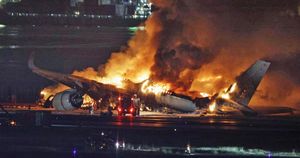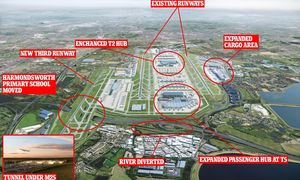Following the devastating plane crash near Washington, D.C., which claimed the lives of 67 individuals, President Donald Trump has ignited controversy by attributing responsibility for the incident to diversity, equity, and inclusion (DEI) hiring practices within the Federal Aviation Administration (FAA). The crash, which involved a passenger plane colliding with a military helicopter near Ronald Reagan National Airport, has left many grappling with both the immediate tragedy and the ensuing political fallout.
Trump’s reaction came during his press conference on Thursday, just days after the accident, where he claimed the FAA’s focus on hiring workers with disabilities and other conditions could be connected to the catastrophic event. "The workers who suffer severe intellectual disabilities, psychiatric problems, and other mental and physical conditions" were cited as part of Trump's critique of the FAA’s hiring policies. He asserted his belief was based on 'common sense', admitting,
"I have no evidence to back my claim but I believe it to be true."
Interestingly, the very initiatives Trump now criticizes were instituted during his own presidency. A diversity program aimed at increasing representation among air traffic controllers, including those he now infers may have contributed to the crash, was launched during his administration. This fact was highlighted by critics who noted the irony of Trump’s comments against the backdrop of his previous policies, underscoring the contradictions often noted by political analysts.
Reacting to Trump's assertions, Republican Congressman Eric Burlison conceded there was no evidence linking DEI hiring to the crash. During his interview on Fox News, he was pressed by host Maria Bartiromo about whether or not there was proof to support his claims. Burlison admitted, "Not until we get to the investigation," highlighting the speculative nature of Trump's statements. His remarks provide insight not only on the immediate repercussions of the crash but also on how political narratives are crafted in the wake of tragedy.
On the same day as Trump’s press conference, CNN’s Abby Phillip condemned the presumptuous and politicized response to the crash during their news coverage. Phillip noted, "The bodies are still in the water, the families are still grieving. We don’t know what caused this." She criticized not only Trump’s focus on DEI but also suggested his comments served as distraction tactics from pressing issues facing his administration, such as significant personnel changes and the recent dismissal of TSA and Coast Guard officials.
Phillip's critique pressed on the urgency of accountability and responsible communication from national leaders during crises. She questioned the timing and appropriateness of Trump’s comments, emphasizing the emotional impact on families still searching for their loved ones. "This blame spectacle could be to take attention away from some of the very serious questions his administration is now facing," Phillip stated, drawing attention to the tenuous position of governmental leadership during times of national emergency.
The discussion surrounding DEI has gained traction, particularly as it relates to workplaces and public sectors, where hiring practices are increasingly viewed through the lens of representation and equality. Trump's comments, eager as they may be to identify culprits, raise significant questions about the responsibility of leadership, especially with the apparent lack of direct correlation between these practices and safety outcomes.
This narrative draws additional weight as aviation safety continues to be a hot-button issue. The Federal Aviation Administration has been under scrutiny for its hiring and operational protocols, particularly as it pertains to ensuring safety across the nation’s aviation system. Critics are watching closely, with many hoping for comprehensive investigations to clarify the cause of this tragic event, uninfluenced by political bias or unfounded accusations.
© The situation has sparked broader conversations about how national tragedies are politicized and whether social policies, like DEI, are fair scapegoats during crises. Reflection on Trump’s statements prompts commentary on the ethics of leadership during emergencies and the importance of focusing on factual evidence rather than politically charged narratives.
While the investigation is set to continue, the immediate political ramifications of this tragic incident serve as reminders of how intertwined leadership communications and national incidents can be. The coming weeks will likely reveal not just the causes of the crash, but how those details play out within the legal and political frameworks, as well as society’s reckoning with the narratives surrounding DEI.
Moving forward, the emphasis will likely return to the search for answers to what led to this tragic midair collision. This incident serves not just as another devastating loss of life but also as a poignant reminder of the delicate balance between political narrative and the responsibility to truth during times of crisis.



